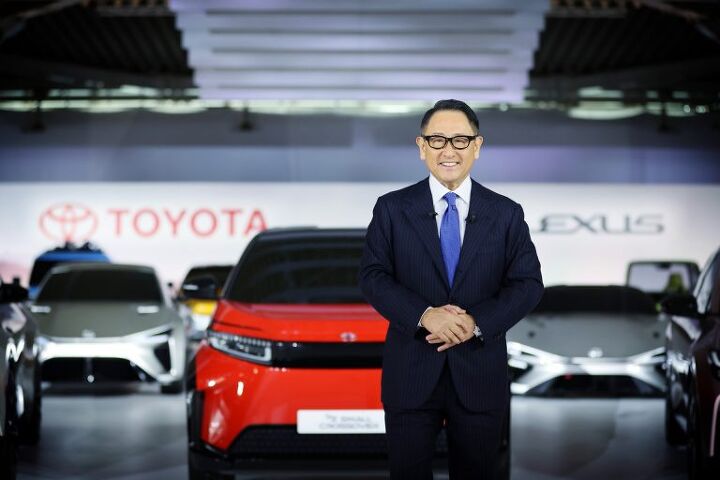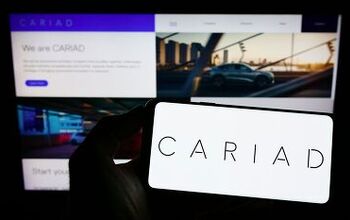Toyota Announces EV Strategy, Readies $70 Billion for the Cause

On Tuesday, Toyota Motor Corp. announced a commitment of 8 trillion yen ($70 billion USD) toward the goal of achieving carbon neutrality someday. Though the concept of any multinational manufacturing entity totally nullifying their carbon footprint seems kind of laughable, so we’ll be referencing this as another electrification strategy — which is still a big deal considering how EV averse Toyota has been thus far.
Despite being an environmental trendsetter with the Prius Hybrid, Toyota has been hesitant to formally commit itself to transition its lineup toward being reliant on battery power. However, President Akio Toyoda has just proudly confirmed that the Japanese automaker would be earmarking the funds for exactly that purpose, noting that the brand (along with Lexus) would be spending the money through 2030 to make sure its global sales of battery electric vehicles (BEVs) reach 3.5 million vehicles annually. Though the most enjoyable aspect of the release was the direct manner it was presented, with Toyoda-san being impressively honest about modern automotive trends.
“We are living in a diversified world and in an era in which it is hard to predict the future. Therefore, it is difficult to make everyone happy with a one-size-fits-all option. That is why Toyota wants to prepare as many options as possible for our customers around the world. We believe that all electrified vehicles can be divided into two categories, depending on the energy that they use,” President Toyoda said during the presentation. “One category is that of ‘carbon-reducing vehicles.’ If the energy that powers vehicles is not clean, the use of an electrified vehicle, no matter what type it might be, would not result in zero CO2 emissions. The other category is that of ‘carbon-neutral vehicles.’ Vehicles in this category run on clean energy and achieve zero CO2 emissions in the whole process of their use. We at Toyota will do our utmost to realize such vehicles.”
This is said to result in a mélange of hybrids, plug-in hybrids, battery-electric vehicles, and hydrogen fuel-cell cars that gradually supplant products using straight-up internal combustion powertrains. Half of the $70 billion will be allocated specifically for the development and manufacturing of BEVs, however. Though Toyoda said the company needed to be mindful of the kind of products it’s bringing to the table if its environmental aspirations are to be taken seriously.
“The important thing is to what degree we can increase a vehicle’s overall energy efficiency, in other words how much less energy a vehicle needs to run. This is exactly the technology that Toyota has been refining for more than 30 years,” he said. “Putting our best efforts into all aspects of these, with this vehicle, we are aiming for a power consumption of 125 watt-hours per kilometer, which would be the highest in the compact SUV class.”
Toyota is hoping to deliver serval modestly sized EVs offering enviable efficiency soon and would like to surpass its previous goal of launching 15 new BEVs by 2025. But it’s also trying to determine how it can adapt existing models to use battery power (presumably via hybridization). From the sound of things, this will be a relatively slow process for the Toyota brand — especially on the North American market — whereas Lexus will be seeing more sweeping changes to cater to higher-earners that tend to buy EVs in greater numbers.
Considering that EV sales still constitute roughly two percent of new vehicle sales annually, this remains a significant risk for Toyota. But it’s a calculated one (with the automaker seeking roughly a third of its total sales volume being electrified by 2030) and something it has been working on behind the scenes for years. While the company is notorious for playing it safe in order to maximize reliability, its R&D department is well funded and doesn’t exist in a vacuum.
It’s been working on all the same technologies its rivals have and has teased out electric concepts that range from pint-sized sports cars to a full-size pickup. Toyota has even expressed a willingness to share its existing battery tech with other manufacturers while it decides how to make use of it and plans on shelling out $1.29 billion to build a battery plant in the United States.
But it would be a lie to suggest Toyota isn’t a little behind the curve in terms of making formal commitments. While your author would argue manufacturer promises are often overblown with little hope of being met within the specified timeframe, Toyota has not attempted to hide the fact that it’s somewhat hesitant to go all-in on EVs. The business decided against joining a handful of automakers (including GM and Ford) to promise to phase out internal-combustion vehicles by 2040. It has similarly positioned itself against the Biden administration’s proposed updates to the EV tax credit scheme (along with Tesla and Honda). However, its chief concern is how the funding would be allocated to give more money to businesses using unionized labor.
Having spoken to more than a few Toyota engineers, the brunt of the businesses’ electrification concerns seem to revolve around a generalized anxiety that the company’s products will lose their greatest strength (above-average reliability) if it rushes into new technologies prematurely. Though I cannot pretend to know what’s actually happening at board meetings or what might be hiding in (or absent from) the Toyota skunkworks garage. Hopefully, we won’t have to wait too long to find out. With the bZ4X having already been shown off, and more bz models supposedly right around the corner, it sounds as though Toyota has plenty more in store for us.
Of course, the bZ4X was jointly developed with Subaru…
[Images: Toyota]

A staunch consumer advocate tracking industry trends and regulation. Before joining TTAC, Matt spent a decade working for marketing and research firms based in NYC. Clients included several of the world’s largest automakers, global tire brands, and aftermarket part suppliers. Dissatisfied with the corporate world and resentful of having to wear suits everyday, he pivoted to writing about cars. Since then, that man has become an ardent supporter of the right-to-repair movement, been interviewed on the auto industry by national radio broadcasts, driven more rental cars than anyone ever should, participated in amateur rallying events, and received the requisite minimum training as sanctioned by the SCCA. Handy with a wrench, Matt grew up surrounded by Detroit auto workers and managed to get a pizza delivery job before he was legally eligible. He later found himself driving box trucks through Manhattan, guaranteeing future sympathy for actual truckers. He continues to conduct research pertaining to the automotive sector as an independent contractor and has since moved back to his native Michigan, closer to where the cars are born. A contrarian, Matt claims to prefer understeer — stating that front and all-wheel drive vehicles cater best to his driving style.
More by Matt Posky
Latest Car Reviews
Read moreLatest Product Reviews
Read moreRecent Comments
- El scotto err not be an EV but to own an EV; too much training this week along the likes of what kind of tree would be if you were a tree? Sorry. Bring back the edit function.
- The Oracle Geesh, Stellantis can’t even perform the upkeep on that relic of a plant. Sad.
- The Oracle I see Tesla introducing disruptive charging technology within 3 years.
- The Oracle I can see into the future and I see fisticuffs and profanity-laced tirades coming to charging locations near ya’ll.
- El scotto Will ascots be discussed at the HOA meetings? Or Purdey shotguns?









































Comments
Join the conversation
Can't think why so many think Toyota is run by stupid people. Probably got strategists brighter than anyone opining here. When you go over what Toyoda said, instead of cherry-picking for clicks, he pointed out the EVs are for the Western developed world. He expected 35% of Toyota's global output would be BEV by 2030. That leaves about 6 or 7 million vehicles a year to be gas, hybrid, PHEV and hydrogen. The West isn't the world. When asked by a somnabulent "reporter" why all Toyotas wouldn't be BEVS by 2030, this is what Daily Kanban writes: "Akio Toyota answered by pointing out that the global car market and its energy situation are diverse. Toyota doesn’t want to “inconvenience” its customers by forcing them into cars that don’t fit into their lives, Toyoda said, and he will offer diverse solutions to that diverse market. He made clear that the goal is 100% carbon neutrality, and not necessarily 100% battery."
@mcs--I believe that increase competition in the EV market will force Tesla into making better quality vehicles at a more competitive price. More charging infrastructure and expanding the power grid is needed along with more affordable prices to get more wide acceptance of EVs. I am building a new condo in Arizona and I requested 220 be put in my garage along with a tankless water heater even though it will be a long long time before I buy a new vehicle especially since my hybrid Maverick will be delivered this March. Even if I don't buy an EV the 220 will make my condo worth more but I will be buying an electric golf cart. I keep most of my vehicles over 10 years and currently have a 2012 E-Assist Buick Lacrosse with 47k miles and a 2013 Honda CRV AWD with 26k so I am in no big hurry to buy another vehicle especially with the new Maverick being delivered in March. I will be 70 in February so I will not be buying a lot more new vehicles but I could later on so I am keeping the option of buying an EV open for the future. I will most likely drive the hybrid Maverick more being that I tend to drive my trucks more and the 42 mpgs urban driving. With the pandemic I am lucky if I put 5k miles a year on a vehicle.